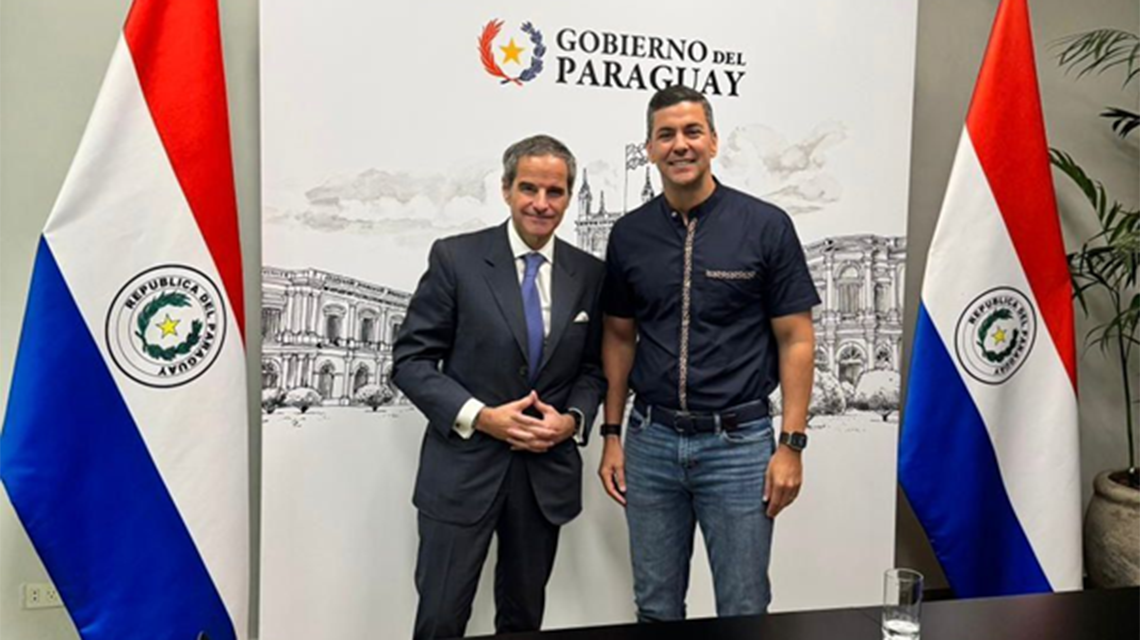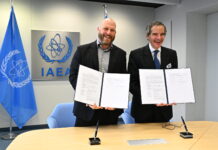Paraguay’s Ambitious Shift Towards Nuclear Energy: A New Chapter in Clean Energy Development
In a significant move towards sustainable energy development, Paraguay is taking bold steps to integrate nuclear energy into its national energy strategy. This transition was highlighted during a recent meeting between Mr. Rafael Mariano Grossi, the Director General of the International Atomic Energy Agency (IAEA), and the President of Paraguay. The discussions emphasized the critical role of nuclear energy, along with renewable sources, in establishing a resilient and clean energy system. This is particularly relevant with the emerging potential of small modular reactors, which offer distinct advantages in terms of efficiency and scalability.
Paraguay is not navigating this transition alone. The nation’s Vice Minister of Mines and Energy, Mauricio Bejarano, has acknowledged the valuable support provided by the IAEA in shaping Paraguay’s energy planning. He expressed a strong commitment to intensifying efforts to train young professionals who will be pivotal in implementing Paraguay’s future energy strategies. This reflects a proactive approach to building a capable workforce adept at managing and advancing the country’s energy infrastructure.
One of the key initiatives supporting this transition is the IAEA’s Atoms4NetZero program. This initiative is designed to assist countries in leveraging nuclear energy as part of their journey towards achieving net-zero carbon emissions. By providing scientific evidence and technical expertise, Atoms4NetZero empowers nations to make informed decisions about incorporating nuclear power into their energy mix. This is especially important for Paraguay, which is in the process of developing a nuclear energy program implementing organization. This entity is expected to play a central role in coordinating all phases of nuclear power infrastructure development, ensuring that the integration of nuclear energy is both efficient and safe.
"The President is leading Paraguay’s energy planning with a vision of the future, integrating different sources, including nuclear," Mr. Grossi stated during a briefing with Paraguayan journalists. "The IAEA is here, accompanying Paraguay and providing all the requested technical and safety support. It is a key moment in Paraguayan energy development and we are beginning to take the first steps on this path."
Mr. Grossi’s visit to Paraguay was marked by a significant gesture of recognition. He was awarded the National Order of Merit ‘Comuneros’ by the National Congress Chamber of Deputies. This honor was bestowed in acknowledgment of his efforts to promote the peaceful use of nuclear technology and the vital assistance the IAEA provided to Paraguay, particularly during the COVID-19 pandemic and in the ongoing fight against cancer.
Understanding Small Modular Reactors
One of the focal points of Paraguay’s nuclear energy strategy is the potential adoption of small modular reactors (SMRs). Unlike traditional nuclear reactors, SMRs are designed to be smaller in size and can be produced in factories and transported to sites where they are needed. This modularity offers several advantages:
- Scalability: SMRs can be added incrementally to match demand, making them a flexible option for growing energy needs.
- Cost-Effectiveness: The smaller size and factory production can lead to reduced construction times and lower costs.
- Safety: SMRs incorporate advanced safety features and are often designed to shut down automatically in case of an emergency.
- Siting Flexibility: Their smaller footprint allows for deployment in locations where larger reactors would not be feasible.
These attributes make SMRs an attractive option for countries like Paraguay, where integrating diverse energy sources is key to achieving a sustainable and reliable energy system.
The Role of the IAEA in Paraguay’s Energy Transition
The IAEA’s involvement in Paraguay’s energy transition is multifaceted. By providing technical and safety support, the agency ensures that Paraguay can develop its nuclear energy capabilities responsibly. This support includes:
- Training and Education: Building a skilled workforce through training programs for young professionals.
- Technical Guidance: Offering expertise in the development and management of nuclear energy infrastructure.
- Safety Assurance: Ensuring that all nuclear energy activities adhere to international safety standards.
The collaboration between Paraguay and the IAEA underlines the importance of international cooperation in the pursuit of clean energy solutions. By drawing on the IAEA’s expertise, Paraguay can advance its nuclear energy ambitions while maintaining a commitment to safety and sustainability.
The Broader Implications of Paraguay’s Energy Strategy
Paraguay’s decision to integrate nuclear energy into its energy mix is not just a national endeavor; it has broader implications for the region and the global energy landscape. As countries seek to balance the growing demand for energy with the urgent need to reduce carbon emissions, the successful implementation of nuclear energy in Paraguay could serve as a model for other nations facing similar challenges.
Moreover, the emphasis on training and developing local expertise ensures that Paraguay’s energy strategy is sustainable in the long term. By investing in human capital, the country is laying the groundwork for a knowledgeable and capable workforce that can continue to innovate and adapt to future energy needs.
Conclusion
Paraguay’s foray into nuclear energy marks a significant step in its journey towards a sustainable and diversified energy future. With the support of international partners like the IAEA and a clear vision for integrating various energy sources, the country is poised to become a leader in the transition to clean energy. As the world watches Paraguay’s progress, there is much to learn from its approach to balancing innovation, safety, and sustainability in energy development.
For more Information, Refer to this article.



































